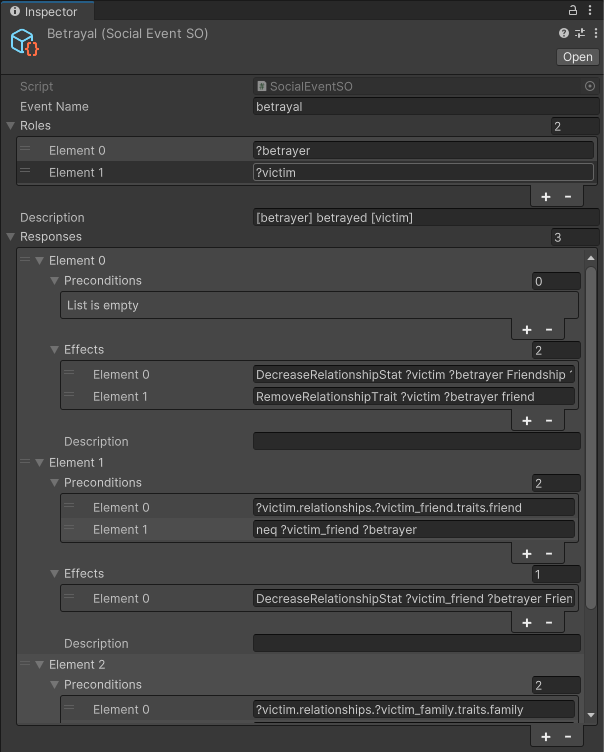-
Notifications
You must be signed in to change notification settings - Fork 0
Create SocialEvents Using ScriptableObjects
Shi Johnson-Bey edited this page Feb 21, 2024
·
2 revisions
Users can create Social Event types directly in the Unity Editor using ScriptableObjects. Using ScriptableObjects has the benefit of taking advantage of Unity's asset management pipeline.
- Right-click in the Project window and select
Create > TDRS > Social Event. - Name the new asset whatever you wish.
- Set the desired social event fields (described below).
- Add the asset to the
Social Eventslist on theSocialEngineControllerwithin your scene. - Try dispatching the event with some characters.
- The sample code in the repo implements a
MockSocialEventCreator(located inAssets/TDRS_Demo/Scripts/). This class allows you to specify an event type and a list of characters to bind to the event roles (in order).
- The sample code in the repo implements a
-
Event Name: (required) The name of the event (used when specifying which event to dispatch) -
Roles: (optional) The names of roles of characters who are involved in the social event -
Description: (optional) A string description describing the social event.- This string uses a
[role_name]template syntax that will substitute role names with the UIDs of the agents bound to those roles. For example, a description of[group_a] ended their feud with [group_b], will expand tomontagues ended their feud with capuletsassuming that agents with UIDsmontaguesandcapuletswere bound to rolesgroup_aandgroup_b, respectively.
- This string uses a
-
Responses: This is where you specify how agents should react to this event. Each entry corresponds to a different response. Agents can respond to the same event multiple times, assuming they pass the preconditions for multiple response entries.-
Preconditions: These are RePraxis query statements that run against TDRS's database. Any variables bound with the query can be used within the effect functions. -
Effects: Effect functions to trigger when dispatching this event. You can read more about effect functions on the Social Events Page. -
Description: A response-specific description. Both even role names and precondition variable names are eligible for substitution using the square bracket syntax.
-
Below is a screenshot of a Social Event Scriptable Object that defines a betrayal event.
